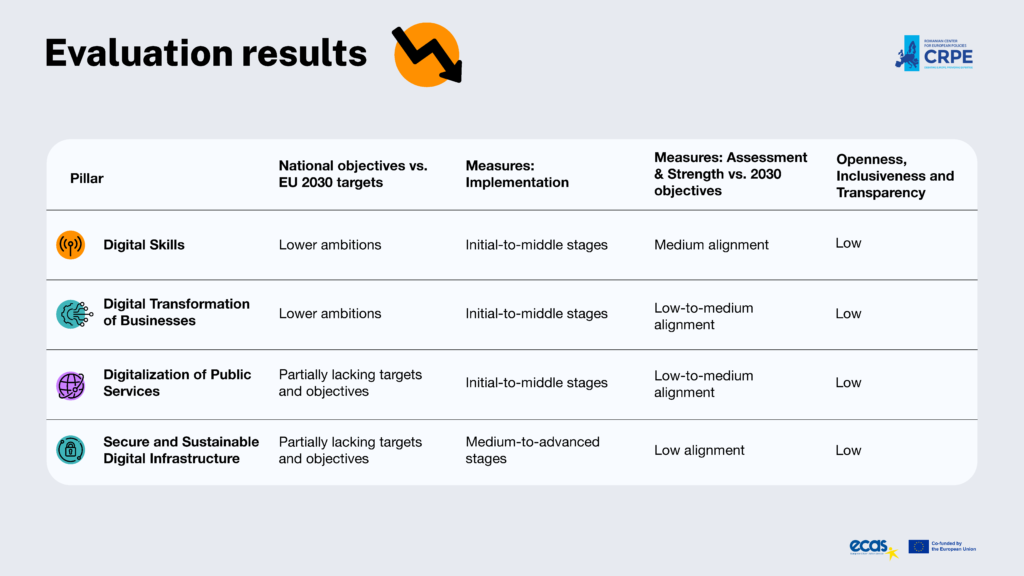A roadmap falling short of the Digital Decade’s ambitions
The European Union has set highly ambitious goals through the Digital Decade Policy Program, but Romania’s national roadmap lags considerably behind. The plan was intended to guide Romania’s digital transformation through a coherent, well-coordinated strategy supported by political commitment and stakeholder engagement—aligned with the EU’s Digital Decade objectives. However, it ultimately falls short, resembling more a formal compliance exercise than a forward-looking, transformative roadmap.
The Romanian Center for European Policies launches the first independent analysis of Romania’s Digital Decade 2030 Roadmap.
Limited ambition and weak governance
Romania’s plan is marked by limited ambition, with national targets consistently below EU objectives, indicators that lack coherence, and measures that often fail to address digital priorities directly. Governance remains weak and leadership diffuse. Rather than presenting a coherent national strategy, many actions repackage pre-existing EU-funded projects originally designed for other purposes.
Targets are not only weaker than EU benchmarks, but also contradictory or unrealistic in several cases—lacking interim milestones and raising serious doubts about their credibility. Persistent implementation delays further undermine progress, with projects repeatedly postponed and reporting either incomplete or unavailable.

Transparency and accountability gaps
Transparency and oversight are almost nonexistent, as the Authority for Digitalization of Romania either lacks the capacity, instruments, and resources to fulfill its coordinating role—or has simply failed to do so. The absence of a formal decision-making mechanism or monitoring framework within the plan further exacerbates the issue.
Public consultations and stakeholder engagement have been minimal, both during the plan’s design and its implementation, undermining accountability and public trust.
Looking ahead: From compliance to transformation
As a result, Romania risks remaining below EU-wide digital objectives and continuing to lag behind other Member States. The 2026 roadmap revision offers a crucial opportunity to move beyond formal compliance toward a genuine, results-driven strategy.
Achieving this transformation requires strong political will and collaboration across sectors—government, business, academia, and civil society alike. By embracing transparency, co-creation, and shared responsibility, Romania can transform its roadmap from a bureaucratic exercise into a true driver of digital progress and innovation.
CRPE’s contribution: open data for accountability and progress
Alongside this analysis, CRPE also provides the first comprehensive compilation of all measures included in Romania’s Digital Decade 2030 Roadmap. The dataset maps each measure’s alignment with EU digital goals, its implementation status, and level of compliance with the Digital Decade targets.
This information is made available in an open, accessible format, allowing researchers, policymakers, journalists, and civil society actors to explore, verify, and reuse the data. By ensuring transparency and public access, CRPE aims to foster greater accountability, evidence-based debate, and a collective effort toward achieving Romania’s digital transformation.
The full report is available here: Romania’s Digital Decade 2030 Roadmap: Building coherence, collaboration, and accountability
The annex with all available measures and their status is available here: Annex Romania’s Digital Decade 2030 Roadmap.
——————————
This paper is part of EmpowerDigi project, funded by European Citizen Action Service (ECAS) in the framework of the EURECA 2025, which is co-funded by the European Union. Views and opinions expressed are however those of the author(s) only and do not necessarily reflect those of the European Union or ECAS. Neither the European Union nor ECAS can be held responsible for them.



